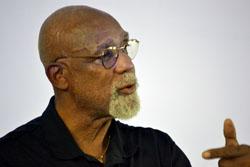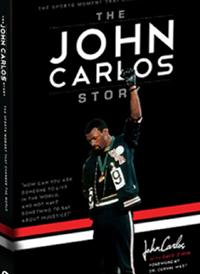Athlete's show of defiance remains one of the most iconic images of Olympic history and the Black Power movement

A group of Rutgers students was treated to a history lesson when former Olympian athlete and activist John Carlos visited the campus to talk about his act of civil disobedience at the 1968 Olympics and the role it played in America’s civil rights movement.
Carlos, a world-class track and field athlete, and fellow Olympian Tommie Smith made headlines around the world with their gesture now immortalized in photographs: two black American sprinters standing on the podium with heads bowed and fists raised in protest the injustices faced by the oppressed in America.
The act caused the athletes to be suspended from the U.S. team and banned from the Olympic Village, but many praised the men as heroes for bringing inequality and racism to center stage.
“You can’t let people dictate. You have to say I have a brain, and I can determine what’s right or wrong,” said Carlos earlier this month addressing a group of students at the Lucy Stone Hall auditorium on the Livingston Campus.
Steve Miller, who teaches at the School of Communication and Information, had been told by colleague Deepa Kumar — who is friends with David Zirin, co-author of Carlos’s recently published The John Carlos Story: The Sports Moment that Changed the World — that Carlos is on tour and would be happy to speak to his “Introduction to Media Systems and Processes” class.
“My jaw dropped. I immediately told her yes, of course,” Miller said. “Carlos is a hero of mine.”
Carlos has a special affinity for the university. His daughter Kimme Carlos works for the African Studies Association at Rutgers, which brings together people with a scholarly and professional interest in Africa.

“I was on the phone with my father and he told me that he would be coming to Lucy Stone Hall on Livingston, and I was like ‘Oh my god’ that’s where I work,” said Kimme Carlos, who hadn’t seen her father, who lives on the west coast, in some time.
During the lecture, Carlos recalled the infamous salute at the Olympic Trials in Mexico. Initially the athletes had planned to boycott the Olympics to protest racism. But the boycott was called off, and although a few prominent African-American athletes did not participate in the games that year, the men still felt the need to bring attention to America’s civil rights movement.
At the medals awards ceremony, Smith and Carlos unzipped their tracksuits to show solidarity with blue collar workers. They wore beaded necklaces in memory of blacks who were lynched, black shirts and socks for the shame of being mistreated as a minority and to signify poverty, and a black glove for strength and unity, which they raised to protest inequality.
Carlos, a Cuban American, also reminisced growing up in Harlem during the 1940s and 1950s. At first, he felt like any kid but as he grew older he began experiencing incidents that convinced him that society must change its treatment of minorities.
Once, Carlos witnessed a black man being beaten by a white police officer on the street. When he asked his father how that could happen, his father explained, ‘all people are not treated equal in this world.’
“I started thinking something’s broken, something isn’t right,” said Carlos.
Toward the end of the lecture, Carlos told the students it was time for a new generation to step up and battle the injustices that plague our country. Alluding to the Occupy Wall Street movement, he urged them to let their voices be heard.
“I’ve never been sorry for what I did. I would do it again … I have no doubts.” Carlos said.
His message resonated with the audience.
“It was amazing to see someone who changed history.” said first-year student Lindsay Payne. Another student, Raymond Riccardi, echoed her sentiment. “I was very moved by the speech. It was very personal and inspirational. It relates to us,” Riccardi said.
Miller said how important it is for students to listen to Carlos’s story,
“The 1960s are known for free love, hippies, and violence but John Carlos’s and Tommie Smith’s one act of civil disobedience not only changed what happened in the game but also had a ripple effect, proving that one person can make an impact on the world.”